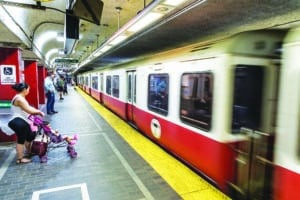With the MBTA budget solidly in the black thanks largely to federal aid, transit activists and community groups are growing increasingly frustrated with the service cuts, saying they are now clearly unnecessary.
The T’s revised fiscal year 2021 budget forecast a $16.8 million shortfall in December, but the monthly bottom line landed $3.5 million in the black – a swing of more than $20 million in a favorable direction, following similar but smaller overperformances in both October and November.
Between that string of news and the at least $250 million the T will get from the most recent federal stimulus package, many in the advocacy sphere argue that the MBTA, which has cited lower ridership numbers during the pandemic, has no justification to keep service cuts in place.
“What started out as a very real budget crisis looks more and more like political machinations every day,” Jarred Johnson, chief operating officer of TransitMatters, told the MBTA Board on Monday. “The MBTA needs to look at what kind of message it’s sending when on one hand, it asks for workers to be furloughed and yet still receives $250 million.”
T officials circled a board meeting on March 22, or perhaps earlier, as the time to consider modifying service levels. Joseph Aiello, the board’s chair, said the upcoming discussion would “take a look at the state of the world” and weigh “any modifications” in the final six weeks of the fiscal year that ends June 30.
With ridership at less than a third of pre-pandemic levels, the T faces a hole of hundreds of millions of dollars next fiscal year. It closed a similar budget hole this year by reallocating money from the capital budget, trimming spending and deploying significant one-time funds granted by the federal government.
The agency so far has pocketed about $74 million in savings that it plans to use in the next spending cycle, and by the end of the fiscal year, it hopes to have $314 million available to plug into any holes.
Another relief package Congress approved in December will direct at least $250 million to the T, where officials plan to use up to $178 million of it to replenish the capital budget that was used to address the T’s deficit and up to $17 million to restore some service.
Lawmakers in Washington are weighing another $1.9 trillion package sought by President Joe Biden that could direct billions more to transit agencies across the country.
In the meantime, the T shuttered weekend service on seven commuter rail lines and the Charlestown and Hingham ferries in late January, and another round of cuts are set to hit the subway and bus systems in March.
The impacts of those changes are still unclear. MBTA officials have not disclosed any information about the savings from the service cuts nearly two months after the board approved them.
“If the authority is making cuts to save money, but it does not know how much it will save, what is the rationale for making cuts?” Caitlin Allen-Connelly, project director for the business coalition A Better City, told the T board. “The MBTA has money to deliver full service now, and it should restore service as soon as possible.”
Gov. Charlie Baker supports trimming service in the short term, arguing that it is “bad public policy” for the T to run buses, trains and ferries on a pre-pandemic schedule when ridership has dropped to a fraction of previous levels.
MBTA Chief Financial Officer Mary Ann O’Hara said Monday that the more than $600 million the T received through the CARES Act is a key reason why the agency was able to produce a balanced annual budget.
O’Hara indicated that without the CARES Act funding, the T would likely be reporting large monthly deficits rather than exceeding its targets.
Monica Tibbits-Nutt, vice chair of the MBTA Fiscal and Management Control Board, urged the agency’s staff to compile a clear account of COVID aid and other reallocated federal funding to help outline its footing in the service plan, which officials dubbed “Forging Ahead.”
“It’s going to be really important for us to be very clear with Forging Ahead and very clear where these funds are going and very clear if we’re making service adjustments, here’s why,” Tibbits-Nutt said. “The last thing we want is customers to think that we’re just holding back this money and cutting their service and treating that as a budgeting exercise as opposed to a response to service.”
Several virtual attendees at Monday’s meeting cited an NBC Boston report that T executives collectively received $162,000 in bonuses last year amid the pandemic’s upheaval.
“It’s incredibly disturbing to see that executives have still been receiving bonuses while our essential workers are left out in the cold, waiting for buses and trains that no longer show up like they used to,” said Julia Wallerce, Boston program manager for the Institute for Transportation and Development Policy. “It’s time to use those federal relief funds, secured through the hard efforts of our members of Congress, to do just that: to provide relief by restoring and maintaining the critical transit service that our front-line workers and transit-dependent residents rely on to survive.”
Aiello also used Monday’s meeting to criticize a Boston Globe editorial that urged the Baker administration to pursue a more aggressive and transformative transportation policy agenda.
The editorial – on which the Baker administration declined to comment, according to editorial board member Joan Vennochi – questions whether Baker will “move beyond the small-bore thinking of the past six years” following the departure of former Transportation Secretary Stephanie Pollack. It flagged several actions Baker took, such as vetoing a hike on ride-hailing fees and creation of a congestion pricing commission, as issues alongside the T’s service cuts.
Aiello, a Baker appointee, said he felt the commentary was “a bit unfortunately uninformed.”
The FMCB, he said, has saved more than $700 million in operational costs since it was convened in 2015, plus another $700 million by reformatting the Green Line Extension project. He also praised the agency’s work to pursue long-term transformations to its bus and commuter rail networks and the $1.7 billion it spent on capital projects in 2020.
“The governor doesn’t need me to speak up for him, but I think this was inherently unfair,” Aiello said, referencing an upcoming discussion on a five-year capital plan. “There are very big, important transformation projects underway. People may be dissatisfied with the pace at which we do this, and I get that, but there is a lot on the plate of the staff at the T. They work like the dickens, and they need to be defended.”







